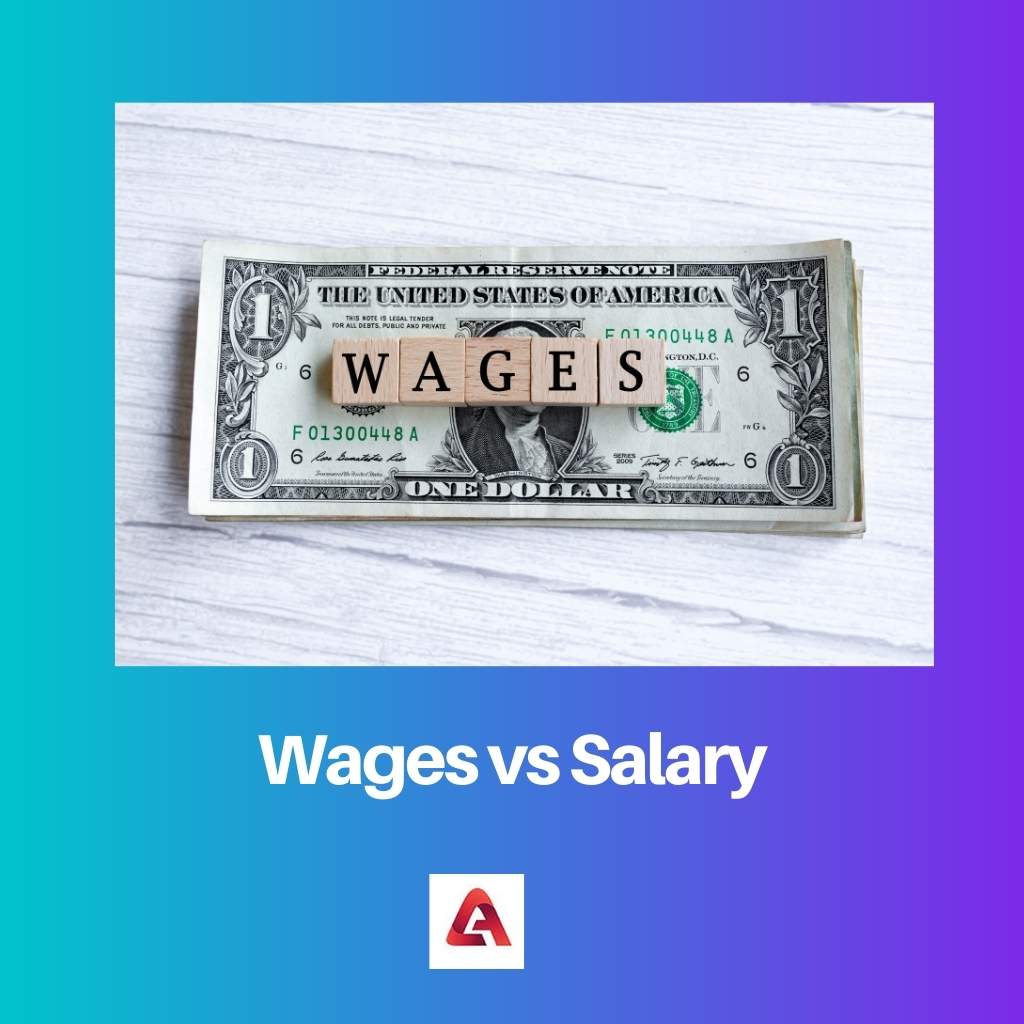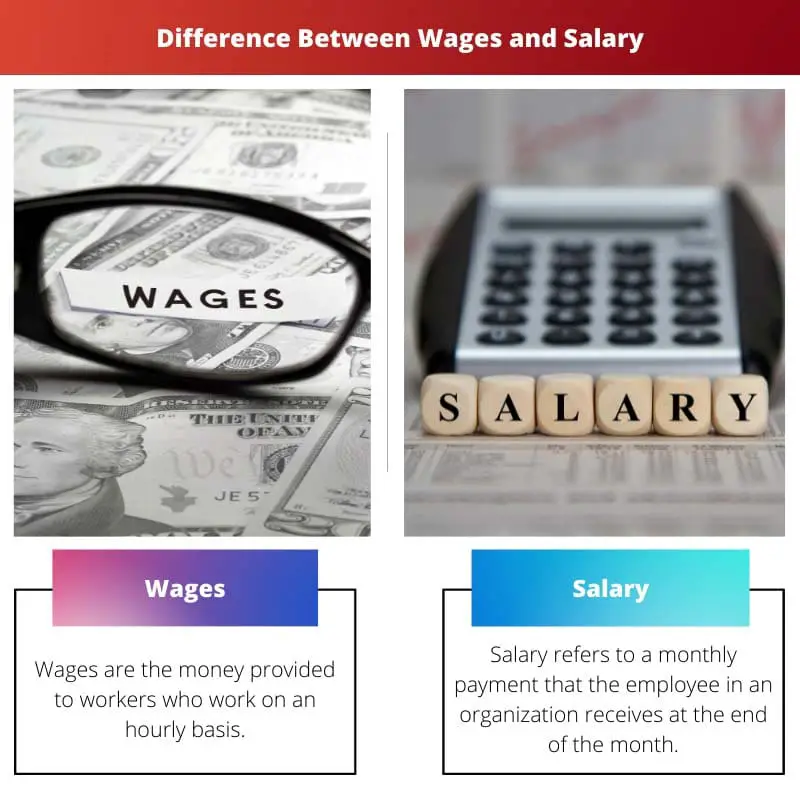Payment is provided for the people who have provided a set of services that were assigned to them by an organizational body or a person in charge. The payment to those people who work is provided with either wages or salary.
The people who work for a stipulated time, say an hour per day, will be paid a wage on an hourly basis. A salary is a sum of money paid every month to an employee by his/her employer.
Key Takeaways
- Wages are payments for hourly work, while salaries are payments for work performed regularly, monthly or annually.
- Wages are variable and depend on the number of hours worked, while salaries are fixed.
- Wages are paid to blue-collar workers, while salaries are paid to white-collar workers.
Wages vs Salary
The difference between wage and salary is that wages are mostly provided to the person on an hourly basis, whereas salary is paid every month for the person working in an organization. Wages are provided to semi-skilled workers, whereas salary is provided to the employees who work a full-time job.

Wages are provided to those who work for a shorter stipulated time. This is provided on the trend of time scale when a person provides his service.
The number of working time periods or hours per day is calculated, and the wage is provided to the workers accordingly. This money is paid on an hourly or daily basis to those who serve or provide their manpower.
Salary is an amount paid to the employee of an organization by the financial team operating in the organization. Salary is not calculated on a work-hour basis; instead, it is provided on a monthly basis. These workers who work for a salary have the privilege to take a sabbatical or paid leave.
Comparison Table
| Parameters of Comparison | Wages | Salary |
|---|---|---|
| Definition | Wages are the money provided to workers who work on an hourly basis. | Salary refers to a monthly payment that the employee in an organization receives at the end of the month. |
| Calculation basis | The calculation basis is the trend of work hours per day. | The salary is provided to an employee on a monthly basis. |
| Leave basis | Since the payment works on an hourly basis, leave days will not be accounted for payment. | Salary receiving individuals have the benefit to take paid leaves. |
| Workers | Workers who receive wages are semi-skilled workers. | Salaried employees are those who work for a management or organization under certain norms. |
| Responsibilities | They have fewer responsibilities and smaller roles to perform. | Salary receiving people are in higher positions, and they have quite a lot of responsibilities. |
What are Wages?
Wages are payments given to workers given a time-based pay scale. Wages are provided to those people on an hourly basis. This payment is provided on a daily or weekly basis. The workers working for this kind of pay produce semi-skilled service or work for the recruiter.
Wages are provided for a worker who has worked for a certain limit of time. This is provided for a work-time basis; hence there is no paid leave like salary receiving persons. Wage-receiving people have smaller responsibilities, and they do not have more duties to look after.
In contrast, the ones receiving a salary will have an exclusive benefit for themselves. Those salaried people can receive the privilege to take paid leave during their work period.
Wage-receiving people do not have any paid leave like salary-receiving people. Because they are paid on the basis of hourly work. A wage is a payment provided to those working individuals who provide their service or labour on a timely basis.

What is Salary?
Salary is the payment provided to a person who provides skilled labour to an organization and gets a monthly based payment for his work is called a salaried individual. Salary-receiving individuals provide skilled work when compared to those wage-receiving employees.
Salary-receiving individuals also have special benefits when compared to those wage-receiving employees who lack them. Salaries people can avail themselves of paid leaves, and they can take a number of leaves that will still be considered paid by the employer.
Wage-receiving people receive payment only based on the working hours per day or weekly or daily basis payment. So, wage-receiving people cannot avail of leave and get paid like salaried people.
Salary provision policies also vary with the company, as some companies also cover insurance plans and other employee benefits with the salary. Salary is determined by a person by comparing the prices or payments provided to another employee on the current market trend.
Salaries are determined and provided to the organization by the talent acquisition team or human resource management, and together payroll sanction is monitored by the financial department in an organization. Usually, those people who receive a salary have bigger roles to look after, and they have more responsibilities to exhibit.

Main Differences Between Wages and Salary
- Wages are paid on an hourly basis, whereas salary is paid on a monthly basis to the employee.
- The calculation of payment is based on the roles performed on an hourly basis, whereas salary is paid on a time scale of a month.
- Wage-earning people do not have paid leaves, whereas salary-receiving people can avail of paid leaves.
- Wage-earning people are not as skilful as compared to that of salaried individuals.
- Wage-earning people have lower positions, whereas salaried persons take higher positions in an organization.

- https://www.hbs.edu/recruiting/employment-data/Pages/default.aspx
- https://ideas.repec.org/a/eee/wdevel/v133y2020ics0305750x2030125x.html

The article’s thorough exploration of wages and salaries provides a well-rounded understanding of how workers are compensated based on their roles and responsibilities.
The distinction between wages and salaries based on the type of work and the mode of payment is effectively conveyed in this article.
The content effectively conveys the differences between wages and salaries, offering a deeper understanding of compensation structures in different work environments.
The article effectively explores the nature of wages and salaries, shedding light on the specific benefits and drawbacks associated with both forms of payment.
The comprehensive explanations and detailed comparison effectively convey the nuances of wage and salary payments in organizational settings.
The detailed descriptions of wages and salaries, along with the comparison table, enrich the reader’s understanding of how compensation is structured within organizational contexts.
The distinction between wage and salary, along with the comparison table, enhances the understanding of how compensation is structured in the workforce.
Both the description of wages and salaries and the comparison table illustrate the key differences between the two forms of payment, providing valuable insights.
This article provides a comprehensive comparison between wages and salaries, clearly highlighting the differences between the two forms of payment.
Absolutely, the article is very informative and well-researched.
The provided comparison table offers a clear and concise overview of the differences between wages and salaries, making it easier to understand.